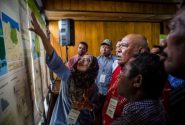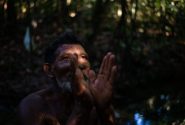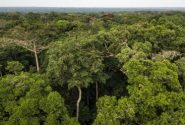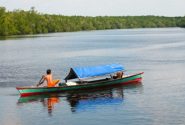LIMA, Peru (8 March, 2012)_REDD+ policies in Latin America can strengthen indigenous territorial management institutions and help defend those territories from external competitors that threaten to exploit insecure land rights, says a new report by the Center for International Forestry Research (CIFOR).
“Indigenous people need strong multilevel institutions – ideally democratic – in order to defend their rights. These should have political support from the state, but they also need legitimacy within a local context,” said Peter Cronkleton, Principal Scientist at CIFOR.
The recommendation is just one of several highlighted in Rights to forests and carbon under REDD+ initiatives in Latin America which attempts to address the complex issue: What should policy-makers consider when implementing REDD+ projects in indigenous territories?
Throughout Latin America, national governments have begun to recognise indigenous territories which define access to and ownership of land and introduce new concepts that differed from customary practice often focused on ‘community’.
These territories are often made up of multiple communities and even ethnic groups, and their size and complexity present major challenges to good territorial governance. At the same time, coordination and negotiation across larger territories provides an opportunity to develop integrated sustainable development models, and the experience of indigenous territories so far could provide important input to the discussions at the Rio +20 conference in June 2012.
Latin America contains over half of the world’s primary forests, much of this in the Amazon basin where 375 indigenous groups occupy territories that hold just over 25% of the region’s forests. Demarcation and titling of these territories has changed the nature of forest tenure enormously since the 1980s. In many Latin American countries, indigenous social movements and their allies have won the recognition of rights to their ancestral lands, leading to a wave of land tenure reforms that have allowed indigenous groups to benefit from more secure access to forests resources.
Regardless of whether the rights of indigenous communities have been recognised, however, indigenous territories continue to be under pressure from colonists, illegal loggers, mining and oil interests whose practices endanger the livelihoods of many forest dwellers.
“It is often assumed that indigenous territories have governance institutions in place, and in some cases these do already exist. But our case studies show that most land titling is happening in multi-community territories where there was no previous overarching governance structure beyond decision-making at the community level,” said Anne Larson, CIFOR Senior Associate and co-author of another recent CIFOR study on the topic .
“Building democratic governance institutions is a real challenge.”
Latin America is set to receive a large share of the US$30 billion that could flow from developed to developing countries each year to reduce deforestation under reducing emissions from deforestation and forest degradation (REDD+). REDD+ schemes are recognised as potentially cheap and cost-effective ways to mitigate climate change but in the context of indigenous territories, REDD+ could unintentionally constitute a new threat or intensify others, especially for those without secure land rights. These threats include competitors claiming REDD benefits and restricting livelihoods activities of indigenous people.
REDD+ planners need to consider the diversity of indigenous territories to best ensure that benefits flow to intended people, said the study.
For example, in the Philippines an institution headed by elected representatives grants land and forest access permits and establishes management norms defining resource access. The Filipino institution manages 15,000 hectares over seven communities and a contiguous land area with no competing claims. A recent CIFOR study also found that in Nicaragua, leaders at the territory level approve logging permits and have access to tax income designated to the territory. Some territories comprise 150,000 hectares with dozens of indigenous and non-indigenous communities.
“Those involved in REDD+ projects in indigenous territories should harness the skills and knowledge of indigenous groups to develop flexible REDD+ models that take into account the specific characteristics of each territory, promoting capacity building and long-term self-governance,” said Larson.
REDD+ could also offer new opportunities: as a policy that tackles the external drivers of deforestation, it will therefore address the primary threats to the integrity of indigenous territories. These schemes also potentially offer support for the constitution of indigenous territories as political, social and economic entities.
However, these opportunities are more likely to be realised in territories with secure rights, said Larson.
“If REDD+ policies respect collective rights such as the right to autonomy, to manage natural resources and to free prior informed consent (FPIC), indigenous people could potentially see such benefits,” said Larson.
To ensure that Rio+20 deliver a global message that forests matter to sustainable development, CIFOR will coordinate one of the most important conferences on forests on 19 June, 2012. Forests: The 8th Roundtable at Rio+20 will discuss new research findings, remaining knowledge gaps and policy implications for integrating forests into the solutions to four key challenges to progress toward a green economy: energy, food and income, water, and climate. Seats are limited so register here to avoid disappointment!
We want you to share Forests News content, which is licensed under Creative Commons Attribution-NonCommercial-ShareAlike 4.0 International (CC BY-NC-SA 4.0). This means you are free to redistribute our material for non-commercial purposes. All we ask is that you give Forests News appropriate credit and link to the original Forests News content, indicate if changes were made, and distribute your contributions under the same Creative Commons license. You must notify Forests News if you repost, reprint or reuse our materials by contacting forestsnews@cifor-icraf.org.












